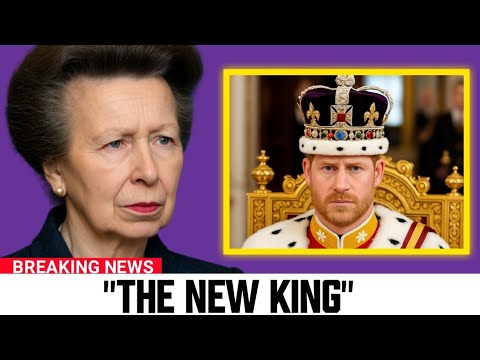Prince Harry’s steadfast dedication and unwavering loyalty to his responsibilities have taken a dramatic and unexpected turn, as he has now ascended to the throne—an outcome that no one within or outside the royal family had anticipated. This shocking twist in the lineage of the British monarchy has sent tremors through Buckingham Palace, shaking the very foundation of centuries-old royal tradition. The world was caught off guard when it was revealed that King Charles, in the final stages of his life, quietly amended the royal line of succession, effectively bypassing his firstborn son, Prince William.
This revelation came not through a regal proclamation but through a discreet leak—first reported by a little-known foreign outlet before being picked up by major media organizations around the globe. At the center of the firestorm is a sealed document that carried Charles’s final, confidential order: that Prince Harry should inherit the crown. This decision, kept secret until after the king’s death, has ignited a storm of questions, confusion, and intense speculation. According to royal insiders, the change was motivated by deeper considerations than mere protocol. It was about ethics, leadership for a modern era, and a desire to preserve the monarchy amid internal fracture and external scrutiny. As this bombshell became public, the atmosphere inside Buckingham Palace was frantic
. Aides scrambled to verify the document’s authenticity, the media exploded with continuous coverage, and the public reacted in polarized waves—some with outrage, others with admiration. Supporters of tradition were stunned, while those calling for a more progressive royal institution celebrated the bold shift. In the midst of the chaos stood two brothers, now positioned as symbols of a divided monarchy—one raised for the throne, the other once seen as the outsider. But this was no PR stunt, no satirical tale—this was a monumental shift born out of a monarch’s final reflections.
In the last days of King Charles III’s life, he found himself increasingly isolated, wrestling not with public appearances or official duties but with the weight of his legacy. His illness, which had been publicly understated, had progressed severely, leaving him physically weak and mentally aware of the limited time he had left. During rare moments of clarity, his thoughts repeatedly returned to Prince Harry. It wasn’t Prince William who dominated these conversations—it was Harry, the son long regarded as the black sheep, the one who stepped away from royal duties, exposed family rifts, and faced criticism for speaking his truth.
Yet it was precisely Harry’s emotional honesty, his moral compass, and his willingness to challenge convention that reportedly moved Charles. According to those close to him, the king saw this not as a betrayal of tradition, but as a vital course correction. He acknowledged that he had contributed to the fracture between his sons and sought to repair it not by restoring the old order, but by reshaping the future. While many assumed such a revelation would come directly from the king, it was instead his sister, the ever-dutiful Princess Anne, who bore the weight of disclosing the contents of the final document. Known for her strict adherence to protocol and distaste for spectacle, the Princess reportedly reacted to the news with solemn clarity.
After reading the sealed document labeled “Final Order of Succession – Confidential,” she reportedly walked out of the room and simply told her secretary that everything was about to change. And indeed, the world shifted. Upon verifying the document’s authenticity through royal archivists, an emergency gathering was convened at Windsor, bringing together senior members of the Privy Council. Legal experts dissected the implications, questioning whether such a move was even permissible under constitutional law.
They combed through signatures, testimonies, and legal precedents. It was confirmed that a handful of trusted individuals—including two royal legal advisers, a close friend of the king, and a senior clergyman—had witnessed and validated the change. All had agreed to strict confidentiality, honoring King Charles’s wish that the decision be revealed only after his death to avoid political instability and familial backlash. But even in death, Charles’s decision raised more questions than it answered. Could a monarch truly overturn centuries of tradition based on personal conviction? According to royal sources, the answer lies partially in a private letter that Charles wrote to both of his sons just before his death.
While the full content remains locked away, excerpts have reportedly been paraphrased by palace insiders. In the message to William, Charles allegedly praised his strength but warned that unbending resolve might ultimately fracture the institution they both served. To Harry, he expressed admiration for his courage and truthfulness, sentiments he confessed to only truly appreciating toward the end of his life. While these words may reflect a father’s late-in-life understanding, they have not calmed the tensions erupting in the aftermath.
Prince William is said to have reacted with a potent mix of grief and fury. According to palace aides, he struck a wall in frustration during a closed-door Privy Council meeting, repeating the phrase, “This isn’t his to give away.” The reaction underscores the emotional and constitutional complexity of the moment—not only had William lost his father, but he now faced the erosion of a destiny that had been his since birth. Meanwhile, Queen Camilla, often a vocal figure in past controversies, has maintained a conspicuous silence throughout the unfolding drama. As the dust begins to settle, the world watches a new era dawn with Prince Harry—once the renegade royal—now wearing the crown. Whether this decision will unite or further divide the monarchy remains to be seen, but one thing is certain: this is not just the end of one reign—it is the beginning of an uncharted chapter in royal history.
